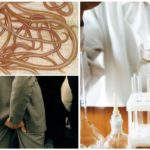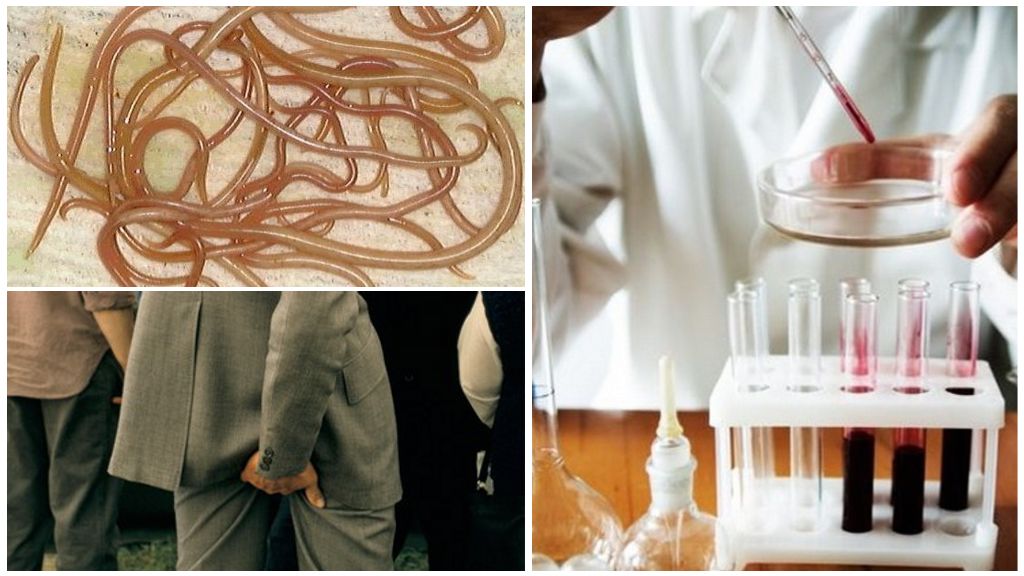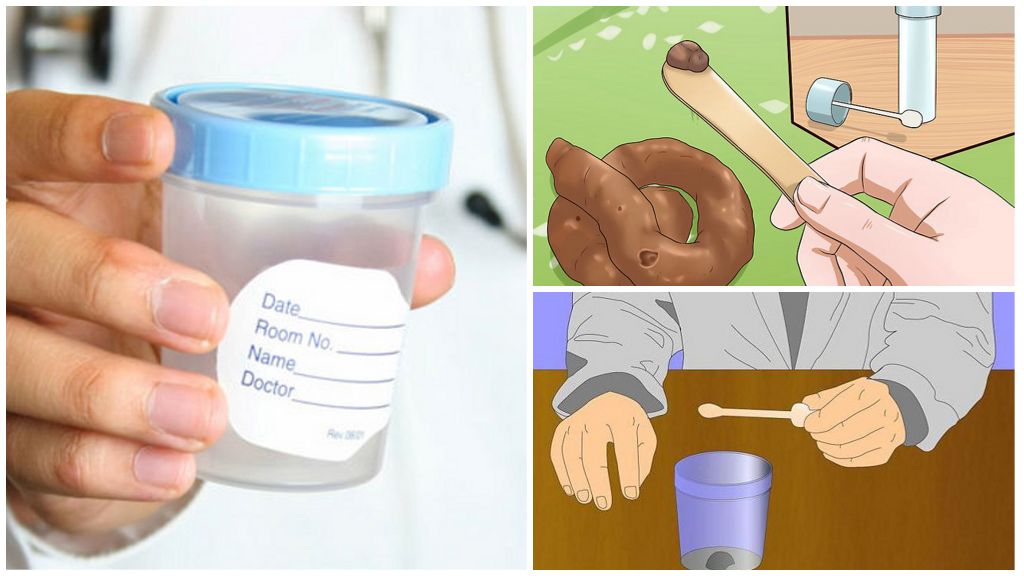Blood test for ascariasis, antibodies to ascaris
Content
- Blood test for ascaris
- Blood test for roundworm
- Analysis of feces for roundworm
If a helminth infection is suspected, a person is examined, blood tests and feces are taken. Antibodies to Ascaris - the most reliable way to diagnose the disease. They appear already at an early stage of migration and are specific for this type of parasite.
Ascaris life cycle and diagnostic features
The person is the main host of the causative agent of ascarisosis Ascaris lumbricoides. In his body, the helminth goes through a full life cycle.
Clinically, ascariasis consists of two phases - migration and intestinal.
When ingested, the mature eggs of the worm are in the digestive tract. Larvae emerge from them and, damaging the intestinal wall, enter the blood vessels. With the flow of blood, they are in the hepatic vein, the right parts of the heart and lungs, rise through the respiratory tract. During cough roundworm fall into the oropharynx. So ends the migration phase.
On a note!
Already while following the bloodstream, immunity reacts to the worms: specific antibodies begin to be produced, white blood cell counts are growing, and the body is allergic. These changes are reflected in the blood picture.
Then the roundworms are again in the digestive tract and begin to multiply. A person discovers inclusions in the feces, resembling white threads, blood. The basis for sending it to the survey can serve as symptoms of the disease:
- nausea, vomiting, anorexia;
- diarrhea and constipation;
- stomach ache;
- fast fatiguability;
- bouts of dry cough;
- exacerbation of bronchial asthma;
- pruritus and rash;
- episodes of fever.
Presume infection with ascaris can be based on the characteristic history: the disease in the warm season, living in the dacha, eating unwashed garden products.
A parasitologist prescribes an examination for ascariasis based on the symptoms and patient questioning data.
Blood tests
The penetration of ascaris into the bloodstream leads to the appearance of non-specific changes in the blood composition - a significant increase in the number of eosinophils and neutrophils. This increase in performance is transient in nature and often becomes a find in the event of a random analysis. It does not indicate infection with ascarids, it occurs in other parasitic diseases.
With a long course of infection may develop anemia. This indicator also does not directly indicate a specific disease.
Class G immunoglobulin
A blood test for antibodies to ascaris is the earliest and most reliable diagnostic method.If positive, the probability of the disease is close to 90%.
The indications for the analysis are:
- clinical signs of acarid infection;
- increase in the number of eosinophils in the blood;
- detection of patient allergies of unknown origin.
Specific immunoglobulin g (Ig G) cells produce B cells after a meeting with ascaris. It is found in the blood within 5-9 days after infection. Antibodies are stored in the body for up to 3 months.
On a note!
An enzyme immunoassay (ELISA) with parasite antigens is used to determine antibodies to ascarid antigens. This analysis has a high degree of sensitivity. Detection of antibodies allows you to make a diagnosis already in the early period of the disease.
Preparation and conduct
Taking a blood test for antibodies to ascaris does not require special preparation. The patient must fulfill the standard requirements:
- 8 hours before the test should not eat food.
- The patient can drink water in the usual quantities.
- On the eve of the analysis should not take alcohol, 1 hour before the blood is prohibited to smoke.
On a note!
For research on antibodies to ascaris, blood is taken from a vein in the area of the ulnar fossa.The procedure is handled by a procedural nurse in a private or public laboratory. The deadline is from 2 to 4 working days.
Decryption
In conclusion, the analysis of antibodies that the patient receives on his hands, indicate one of three conclusions and the so-called positivity coefficient of the sample (or KP). The table below shows all possible outcomes.
| Conclusion | KP value |
|---|---|
| Positive result | More than 1 |
| negative result | less than 0.85 |
| Doubtful result | From 0.85 to 1 |
KP indicator describes the degree of positivity of the sample material, its value is useful for the correct evaluation of the analysis of ascaris. It does not change linearly. The doctor will explain: this means that the numerical value can not be used to assess the state in dynamics.
The decoding analysis for antibodies is carried out as follows. A negative result will be in a healthy person. Also, the level of Ig Ig antibodies to ascaris will not reach the desired value and will not be detected in the following cases:
- at an early stage of infection;
- with prolonged illness;
- in individuals with mild immunity.
A doubtful result is possible with a low level of immunoglobulin G. This happens at the very beginning of the disease, when the concentration of antibodies is still low, with various immune disorders. In this case, the analysis should be repeated after 1.5-2 weeks or other methods of diagnosis.
On a note!
When receiving a positive result for antibodies in 90% speak about the migration stage of ascaris. False positive reactions are rare. The cost of testing for antibodies is from 500 rubles.
Feces
Coprological studies will help to identify parasites at the intestinal stage. So the patient will be sent for stool microscopy, when the diagnosis of ascaris is carried out by detecting individuals, their fragments or eggs in a smear.
Preparation for the study is carried out within 2-3 days and includes:
- Refusal from the use of food that causes gas.
- Discontinuation of medication, including rectal suppositories, which may affect the test result.
- Before going to bed, the patient should take a shower and wash off thoroughly.
- You can not use an enema to obtain material, defecation should occur naturally.
Important!
During the collection of the analysis it is necessary to ensure that no impurities - urine, blood - get into the sample. So to get the correct result, you should not conduct a study during menstruation, bleeding from hemorrhoidal veins.
To collect the analysis for ascariasis, you should use a special pharmacy container with a lid or a carefully washed hermetically sealed container. Do not touch the inside of the jar with your hands.
Material carried to the laboratory no later than 7-8 hours from its collection. Otherwise, there is a risk of getting a false negative result.
Fecal microscopy
The laboratory doctor takes a sample from the material obtained, applies it to a glass slide, and examines it under a microscope. With a positive result in the feces find the bodies of ascaris or their fragments, eggs, worm. The accuracy of the analysis depends on the number of parasites in the intestine. If they do not have time to multiply sufficiently, there is a risk that the roundworm just will not fall into the smear. In this case, the result will be evaluated as negative.
Important!
If the doctor suspects infection with ascaris, to increase the accuracy, he will refer the patient for an examination from 3 times with an interval of 7-10 days.Even one-time detection of helminths in a series of samples is considered a positive result.
PCR examination of feces
A more effective method is considered PCR analysis of feces for roundworm. Few people know what it is - a polymerase chain reaction. It helps to detect pieces of parasite DNA, a microorganism in various biological media. Since the sequence of substances in the chain is individual for each type of infectious agent, this analysis is considered the most sensitive.
A positive result indicates the presence of ascaris in the sample. This analysis is often prescribed with PCR in Giardia.
Preparation for it has no fundamental differences from the usual analysis of feces. Material should be collected carefully, without touching the inner surface of the container.
On a note!
The price of fecal analysis for ascaris is from 510 rubles, the time period is 1-2 days.
If there are other symptoms of the disease, the parasitologist will send for additional examinations:
- analysis of antibodies to other parasites;
- chest x-ray;
- sputum analysis;
- x-ray of the abdominal cavity;
- Ultrasound examination of the abdominal cavity.
A blood test for antibodies to ascaris helps to establish the diagnosis at an early migration stage.diseases. With the movement and massive reproduction of parasites in the intestine, feces research is of greater importance.











